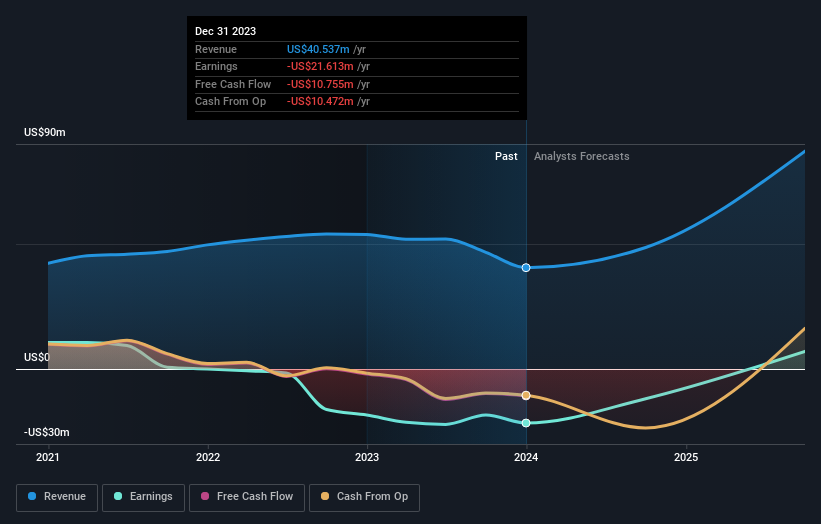Institutions profited after Genasys Inc.'s (NASDAQ:GNSS) market cap rose US$24m last week but retail investors profited the most
Key Insights
Genasys' significant retail investors ownership suggests that the key decisions are influenced by shareholders from the larger public
50% of the business is held by the top 16 shareholders
If you want to know who really controls Genasys Inc. (NASDAQ:GNSS), then you'll have to look at the makeup of its share registry. The group holding the most number of shares in the company, around 44% to be precise, is retail investors. Put another way, the group faces the maximum upside potential (or downside risk).
Following a 29% increase in the stock price last week, retail investors profited the most, but institutions who own 35% stock also stood to gain from the increase.
Let's delve deeper into each type of owner of Genasys, beginning with the chart below.
Check out our latest analysis for Genasys
What Does The Institutional Ownership Tell Us About Genasys?
Institutions typically measure themselves against a benchmark when reporting to their own investors, so they often become more enthusiastic about a stock once it's included in a major index. We would expect most companies to have some institutions on the register, especially if they are growing.
Genasys already has institutions on the share registry. Indeed, they own a respectable stake in the company. This suggests some credibility amongst professional investors. But we can't rely on that fact alone since institutions make bad investments sometimes, just like everyone does. When multiple institutions own a stock, there's always a risk that they are in a 'crowded trade'. When such a trade goes wrong, multiple parties may compete to sell stock fast. This risk is higher in a company without a history of growth. You can see Genasys' historic earnings and revenue below, but keep in mind there's always more to the story.
It looks like hedge funds own 18% of Genasys shares. That catches my attention because hedge funds sometimes try to influence management, or bring about changes that will create near term value for shareholders. Integrity Wealth Advisors, LLC, Asset Management Arm is currently the company's largest shareholder with 13% of shares outstanding. AWM Investment Company Inc is the second largest shareholder owning 13% of common stock, and Manatuck Hill Partners, LLC holds about 5.4% of the company stock.
Looking at the shareholder registry, we can see that 50% of the ownership is controlled by the top 16 shareholders, meaning that no single shareholder has a majority interest in the ownership.
While studying institutional ownership for a company can add value to your research, it is also a good practice to research analyst recommendations to get a deeper understand of a stock's expected performance. There are a reasonable number of analysts covering the stock, so it might be useful to find out their aggregate view on the future.
Insider Ownership Of Genasys
The definition of an insider can differ slightly between different countries, but members of the board of directors always count. Management ultimately answers to the board. However, it is not uncommon for managers to be executive board members, especially if they are a founder or the CEO.
Most consider insider ownership a positive because it can indicate the board is well aligned with other shareholders. However, on some occasions too much power is concentrated within this group.
Our most recent data indicates that insiders own some shares in Genasys Inc.. As individuals, the insiders collectively own US$2.7m worth of the US$106m company. Some would say this shows alignment of interests between shareholders and the board, though we generally prefer to see bigger insider holdings. But it might be worth checking if those insiders have been selling.
General Public Ownership
With a 44% ownership, the general public, mostly comprising of individual investors, have some degree of sway over Genasys. While this size of ownership may not be enough to sway a policy decision in their favour, they can still make a collective impact on company policies.
Next Steps:
While it is well worth considering the different groups that own a company, there are other factors that are even more important. Consider for instance, the ever-present spectre of investment risk. We've identified 3 warning signs with Genasys (at least 1 which is potentially serious) , and understanding them should be part of your investment process.
Ultimately the future is most important. You can access this free report on analyst forecasts for the company.
NB: Figures in this article are calculated using data from the last twelve months, which refer to the 12-month period ending on the last date of the month the financial statement is dated. This may not be consistent with full year annual report figures.
Have feedback on this article? Concerned about the content? Get in touch with us directly. Alternatively, email editorial-team (at) simplywallst.com.
This article by Simply Wall St is general in nature. We provide commentary based on historical data and analyst forecasts only using an unbiased methodology and our articles are not intended to be financial advice. It does not constitute a recommendation to buy or sell any stock, and does not take account of your objectives, or your financial situation. We aim to bring you long-term focused analysis driven by fundamental data. Note that our analysis may not factor in the latest price-sensitive company announcements or qualitative material. Simply Wall St has no position in any stocks mentioned.


